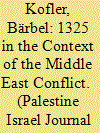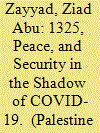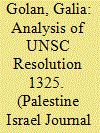|
|
|
Sort Order |
|
|
|
Items / Page
|
|
|
|
|
|
|
| Srl | Item |
| 1 |
ID:
175792


|
|
|
|
|
| Summary/Abstract |
The implementation of international human rights protections such as UNSCR 1325 and 2250 and the Responsibility to Protect doctrine is more than an obligation if we are to attain justice, peace, security, and democracy in the region; it is the future.
|
|
|
|
|
|
|
|
|
|
|
|
|
|
|
|
| 2 |
ID:
175790


|
|
|
| 3 |
ID:
175773


|
|
|
|
|
| Summary/Abstract |
The political participation of women should have long been a matter of discussion — if only because they make up half of the world’s population. We also know that when women are involved in processes, these processes change. According to a study by UN Women, this translates into concrete terms in the context of foreign and peace policy: If women were involved in the negotiation of a peace treaty, the probability that this peace would be maintained for 15 years or more would increase significantly.
|
|
|
|
|
|
|
|
|
|
|
|
|
|
|
|
| 4 |
ID:
175776


|
|
|
|
|
| Summary/Abstract |
United Nations Security Council Resolution 1325 was full of promise, not just when it was first passed in October 2000 but for many years afterward. It brought hope to women peace activists for a variety of reasons — not least its recognition of the importance, and indeed the necessity, of actively involving women in peace processes. It stressed the need for women’s meaningful participation in negotiations along with the need for protecting, even prioritizing the rights of women affected by war or conflict.
|
|
|
|
|
|
|
|
|
|
|
|
|
|
|
|
| 5 |
ID:
175772


|
|
|
|
|
| Summary/Abstract |
While the year 2020 was heading toward its end, we at the Palestine-Israel Journal were heading toward closing our last issue for this year, which is devoted to United Nations Security Council Resolution 1325 on women, peace, and security. With wonderful, outstanding women from academia and the public sector, we believe we have produced an excellent issue. We believe that it will serve as an impressive resource on this resolution not only for Palestine and Israel but the whole world. Because of the global importance of the subject, we were careful to include a wide spectrum of contributions from the region and abroad. This issue was made possible by the generous support of the Foreign Ministry of the Federal Republic of Germany, and for that we express our gratitude and thanks. This is not the first time that we have collaborated with the German government, and we hope it will not be the last.
|
|
|
|
|
|
|
|
|
|
|
|
|
|
|
|
| 6 |
ID:
175779


|
|
|
|
|
| Summary/Abstract |
United Nations Security Council Resolution 1325, enacted in 2001, called for (and was designed to encourage) countries to include women in decision-making regarding war, peace, and security. The demand was based on three principles. The first of these was the principle of equality, according a right enshrined in democracy. Women should be included simply because they are a major part of the citizenry and, therefore, have a right to participate in such important decision-making. The second principle was that women are the main victims of war and, as such, they should have a say in decisions that will actually have a great effect on them. The third principle was that women bring something unique to the table.
|
|
|
|
|
|
|
|
|
|
|
|
|
|
|
|
| 7 |
ID:
175795


|
|
|
|
|
| Summary/Abstract |
Twenty years after Resolution 1325, there is insufficient political will to implement the provisions, so civil society must once again play an essential role in bringing this agenda to life.
|
|
|
|
|
|
|
|
|
|
|
|
|
|
|
|
| 8 |
ID:
175784


|
|
|
|
|
| Summary/Abstract |
No practical decisions and steps have been taken to achieve actual change on the ground to ensure the rights of Palestinian women, who suffer from violence stemming from the Israeli occupation and repressive measures, political paralysis, an outdated legal system, poverty and unemployment, and the effects of the coronavirus pandemic.
|
|
|
|
|
|
|
|
|
|
|
|
|
|
|
|
| 9 |
ID:
175781


|
|
|
|
|
| Summary/Abstract |
The United Nations Security Council unanimously passed Resolution 1325 on October 31, 2000. This resolution, which focuses on women, peace, and security, calls on member states to “protect women and girls from gender-based violence … in situations of armed conflict;” “adopt a gender perspective” when “negotiating and implementing peace agreements;” increase women’s participation at decision-making levels in conflict resolution and peace processes;” and increase women’s representation “at all decision-making levels in national, regional, and international institutions and mechanisms for the prevention, management, and resolution of conflict.” In this article, I consider how these different imperatives have been addressed in the Palestinian-Israeli context. In particular, I will focus on the 1967 territories and on the response of the Palestinian Authority (PA) to the resolution.
|
|
|
|
|
|
|
|
|
|
|
|
|
|
|
|
| 10 |
ID:
175774


|
|
|
|
|
| Summary/Abstract |
The full realization of gender equality is imperative because women can shift the paradigm from military to human security and from victimhood to inclusive humanity and transform the unequal power dynamics of Israel-Palestine relations.
|
|
|
|
|
|
|
|
|
|
|
|
|
|
|
|
| 11 |
ID:
175794


|
|
|
| 12 |
ID:
175796


|
|
|
|
|
| Summary/Abstract |
There can be no peace without women and without respect for human rights; working toward gender equality is vital if we are to achieve a just peace between Palestinians and Israelis.
|
|
|
|
|
|
|
|
|
|
|
|
|
|
|
|
| 13 |
ID:
175780


|
|
|
|
|
| Summary/Abstract |
It’s been 20 years, and “1325” are perhaps the best known numbers among the thousands of UN resolutions.
It all started when Sanam Anderlini, a young woman who worked at International Alert in London, came to The Hague Appeal for Peace conference in May 1999. An informal group of women met to talk about women and peace, and Sanam suggested that we make a proposal to the Security Council, which had previously passed a resolution on children. At a follow-up meeting in June 2000, a handful of us met at UNIFEM, which since has become UN WOMEN, and drafted what became United Nations Security Council Resolution 1325.
|
|
|
|
|
|
|
|
|
|
|
|
|
|
|
|
| 14 |
ID:
175787


|
|
|
|
|
| Summary/Abstract |
Israel’s failure to adopt a National Action Plan to implement Resolution 1325 demonstrates a policy of indifference to the need to act to achieve equality for women, which is particularly egregious in the context of the ongoing armed conflict.
|
|
|
|
|
|
|
|
|
|
|
|
|
|
|
|
| 15 |
ID:
175775


|
|
|
|
|
| Summary/Abstract |
For Israeli and Palestinian women activists, the adoption of United Nations Security Council Resolution 1325 on October 31, 2000, was the culmination of intense efforts to introduce gender directly into the promotion of peace, the protection of civilians (especially women and children) in protracted conflicts, and the prevention of further escalation. Twenty years later, this landmark resolution still stands as a beacon in the dual struggle against militarism and patriarchy, although its goals have yet to be realized. How has 1325 been used in the context of the Israeli-Palestinian confrontation during the past 20 years? Why have efforts to advance its core precepts largely faltered to date? And where can feminists devoted to a just and durable end to the Palestinian-Israeli conflict go from here?
|
|
|
|
|
|
|
|
|
|
|
|
|
|
|
|
| 16 |
ID:
175783


|
|
|
|
|
| Summary/Abstract |
In September 2020, the Abraham Accords, signed by Israel, the UAE, and Bahrain, were published — the first official peace agreements between Israel and an Arab country since the peace treaty with Jordan in 1994. Although the Abraham Accords were presented by the signatories as an important milestone toward regional cooperation, they do not address the continued occupation or the rights of Palestinians, leaving the most controversial issues aside. Coincidently or not, they also fail to mention women and, as such, do not differ from previous accords signed by Israel in the 1990s in their approach to gender in terms of process, content, or discourse.
|
|
|
|
|
|
|
|
|
|
|
|
|
|
|
|
| 17 |
ID:
175785


|
|
|
| 18 |
ID:
175791


|
|
|
|
|
| Summary/Abstract |
For women to be able to play leading roles in peacebuilding in Palestine and around the world, some radical, comprehensive, and sustainable changes in the educational system are needed first.
|
|
|
|
|
|
|
|
|
|
|
|
|
|
|
|
| 19 |
ID:
175777


|
|
|
|
|
| Summary/Abstract |
The position presented in this article is based on the belief that most women in Israel, regardless of their ethnicity, education level, or political agenda, strive to live in peace. Although most of them may believe it impossible and many may believe that they cannot promote peace in any way, as studies of global peace processes and agreements suggest, peace requires wide public support from across as many sectors as possible.
|
|
|
|
|
|
|
|
|
|
|
|
|
|
|
|
| 20 |
ID:
175786


|
|
|
|
|
| Summary/Abstract |
I started writing this article by reading the one I wrote for PIJ’s “Women and Power” issue on the occasion of the 10th anniversary of our beloved United Nations Security Council (UNSC) Resolution 1325 on women, peace, and security (WPS). I’m a person who always sees the glass half full, so I would say there has been some progress in relation to the WPS agenda. I am also realistic, however, so I will outline below the implementation gaps and accountability deficits.
|
|
|
|
|
|
|
|
|
|
|
|
|
|
|
|
|
|
|
|
|